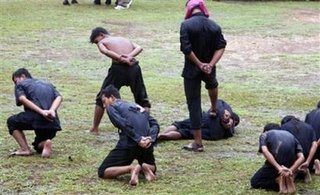 Cambodian Fine Arts University students perform a scene imitating Khmer Rouge atrocity at Choeung Ek, a former 'killing field' site about 10 kilometers (6 miles) south of the capital Phnom Penh, Cambodia, Saturday, May 20, 2006. The performance was part of the annual 'Day of Anger' held to commemorate the victims of the Khmer Rouge genocide that caused the death of some 1.7 million people in the late 1970s. (AP Photo/Heng Sinith)
Cambodian Fine Arts University students perform a scene imitating Khmer Rouge atrocity at Choeung Ek, a former 'killing field' site about 10 kilometers (6 miles) south of the capital Phnom Penh, Cambodia, Saturday, May 20, 2006. The performance was part of the annual 'Day of Anger' held to commemorate the victims of the Khmer Rouge genocide that caused the death of some 1.7 million people in the late 1970s. (AP Photo/Heng Sinith) CHOEUNG EK, Cambodia (AP) - Cambodia remembered the victims of the Khmer Rouge regime with its annual "Day of Anger" on Saturday, with some participants calling for a speedy convening of a United Nations-assisted tribunal to prosecute the movement's surviving leaders.
About 1,000 Cambodians, including 270 Buddhist monks, gathered at Choeung Ek, a former Khmer Rouge "killing field" dotted with mass graves about 10 kilometers (six miles) south of the capital, Phnom Penh.
"Like other Cambodians, I very much want to see the trial happen as soon as possible. I do not harbor any revenge, but this is history which we must resolve," said 53-year-old Yun Nai, who lost her parents and many other relatives to starvation and execution during the 1970s Khmer Rouge regime.
Protected from morning rain by a makeshift tarpaulin roof, she joined others in watching about 30 students perform depictions of torture and execution committed by the ultra-communists.
All performers wore black uniforms, the standard attire of the Maoist-inspired movement. Some acted as executioners swinging heavy sticks at the heads of victims whose armed were bound behind their backs.
The performance was staged just meters (yards) away from mass graves where thousands of executed victims were buried and a concrete memorial containing skulls unearthed after the regime was toppled by a Vietnamese invasion in 1979.
The agrarian policies of the Khmer Rouge caused the death of some 1.7 million people from starvation, disease, overwork and execution.
The movement finally collapsed in 1999, a year after the death of its leader, Pol Pot. No senior Khmer Rouge leaders have been brought to justice, and several of Pol Pot's top lieutenants, aged and infirm, still live freely in Cambodia.
Cambodia and the United Nations, after many years of bickering, agreed in 2003 to jointly establish a tribunal to try the remaining leaders.
The effort gained momentum after the appointment of 30 Cambodian and international jurists early this month to oversee the trials, which may start next year.
"It lifted my spirit when I heard the news that the trial process would begin soon," Chea Yada, 48, said with tears in her eyes. She said she lost about 30 relatives, adding that she would like to see the tribunal "mete out the heaviest punishment possible to the Khmer Rouge leaders."-AP
About 1,000 Cambodians, including 270 Buddhist monks, gathered at Choeung Ek, a former Khmer Rouge "killing field" dotted with mass graves about 10 kilometers (six miles) south of the capital, Phnom Penh.
"Like other Cambodians, I very much want to see the trial happen as soon as possible. I do not harbor any revenge, but this is history which we must resolve," said 53-year-old Yun Nai, who lost her parents and many other relatives to starvation and execution during the 1970s Khmer Rouge regime.
Protected from morning rain by a makeshift tarpaulin roof, she joined others in watching about 30 students perform depictions of torture and execution committed by the ultra-communists.
All performers wore black uniforms, the standard attire of the Maoist-inspired movement. Some acted as executioners swinging heavy sticks at the heads of victims whose armed were bound behind their backs.
The performance was staged just meters (yards) away from mass graves where thousands of executed victims were buried and a concrete memorial containing skulls unearthed after the regime was toppled by a Vietnamese invasion in 1979.
The agrarian policies of the Khmer Rouge caused the death of some 1.7 million people from starvation, disease, overwork and execution.
The movement finally collapsed in 1999, a year after the death of its leader, Pol Pot. No senior Khmer Rouge leaders have been brought to justice, and several of Pol Pot's top lieutenants, aged and infirm, still live freely in Cambodia.
Cambodia and the United Nations, after many years of bickering, agreed in 2003 to jointly establish a tribunal to try the remaining leaders.
The effort gained momentum after the appointment of 30 Cambodian and international jurists early this month to oversee the trials, which may start next year.
"It lifted my spirit when I heard the news that the trial process would begin soon," Chea Yada, 48, said with tears in her eyes. She said she lost about 30 relatives, adding that she would like to see the tribunal "mete out the heaviest punishment possible to the Khmer Rouge leaders."-AP

























No comments:
Post a Comment